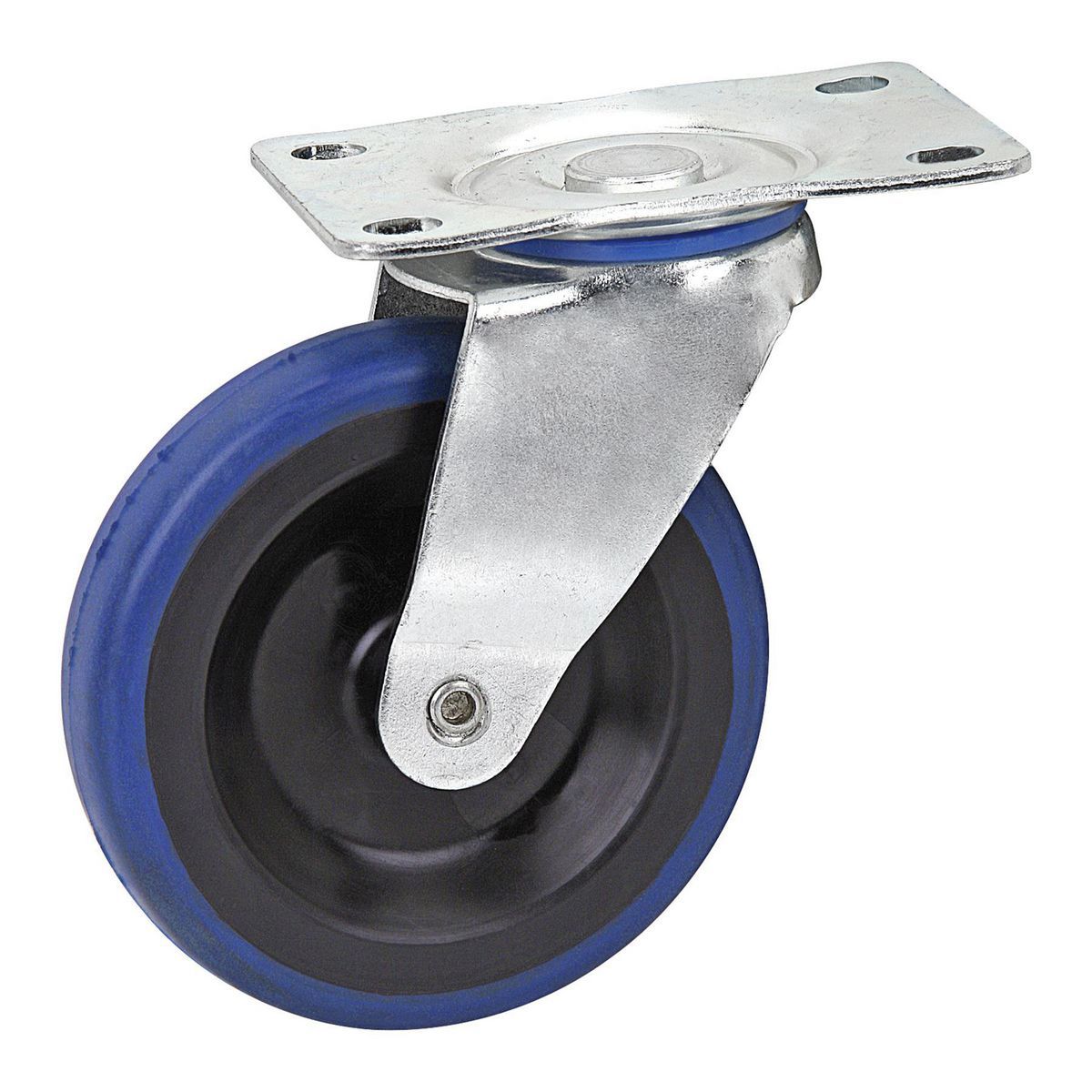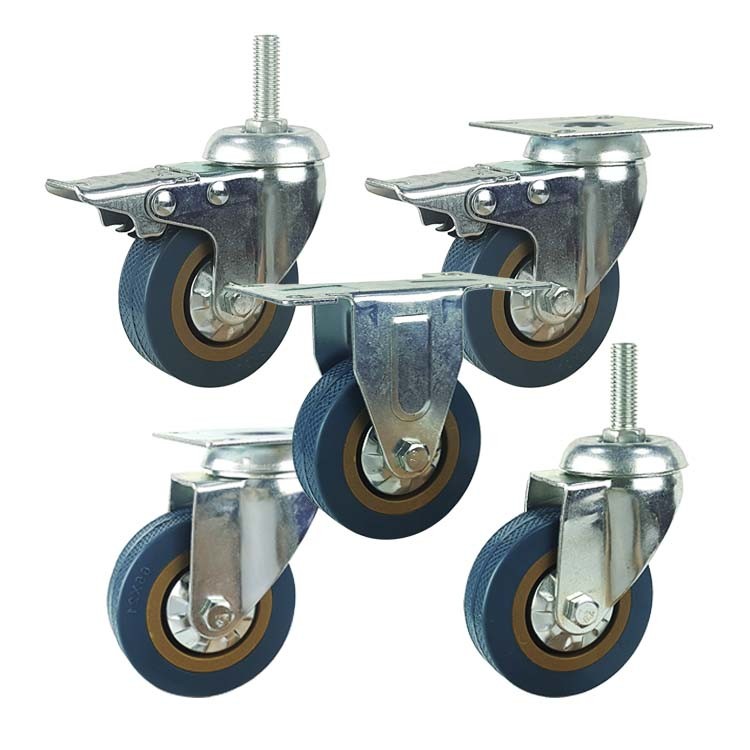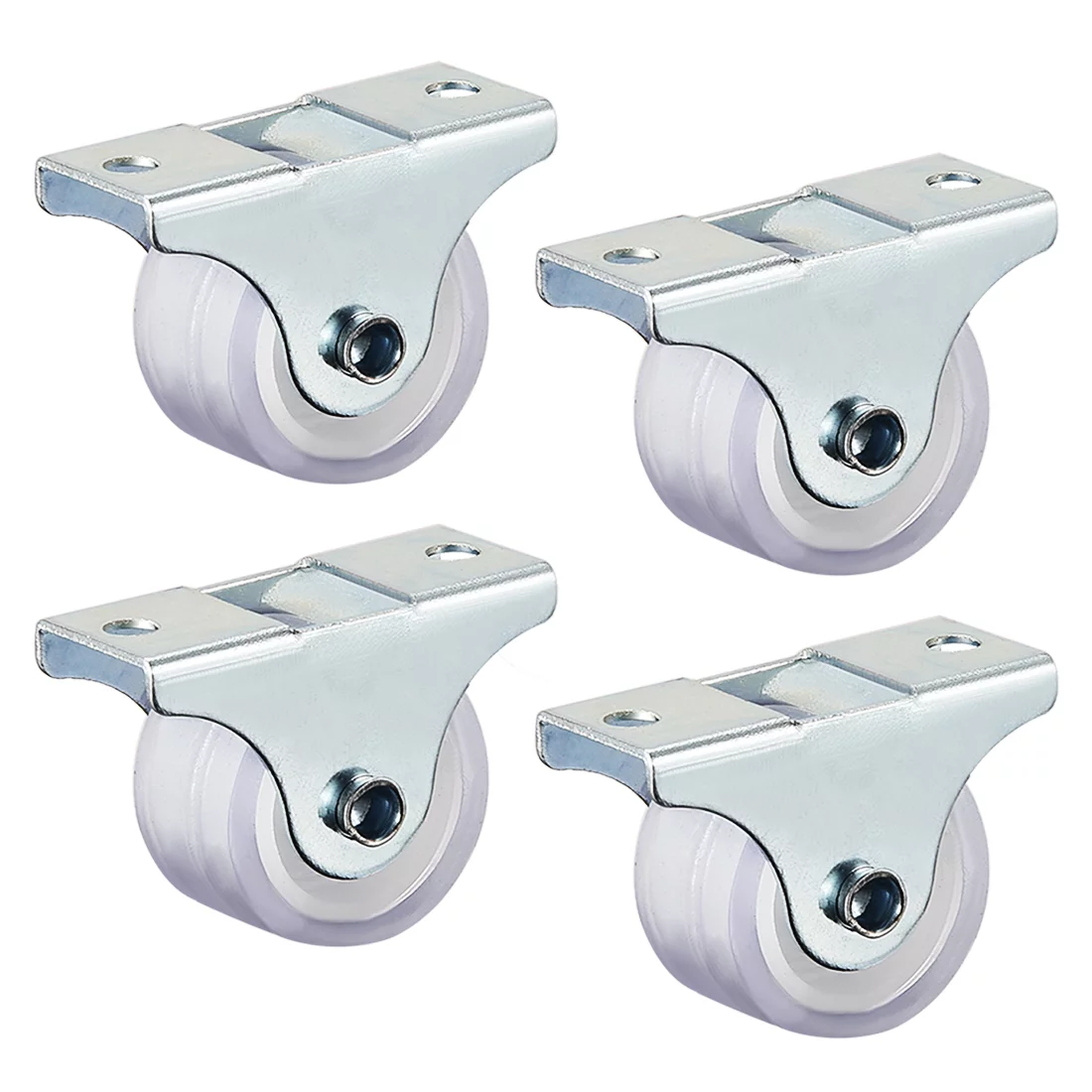Product Description
Furniture Hardware 1″-4″ Wheel Iron+PVC Caster Wheel
Product Details:
| Product name |
Furniture Hardware 1″-4″ Wheel Iron+PVC Caster Wheel |
| Item No. |
HT-08.056S-B |
| Material |
Iron + PVC |
| Wheel diameter |
D25.5/30/39/50/65/75mm |
| Width |
17/21/26mm |
| Height |
33/36/50/63/84/95mm |
| Loading capacity |
10/20/30/35/45KG |
| Color |
Red |
FAQ
Q1:What’s the minimum order quantity for the first purchasing?
A1:3000 pcs/size or total amount for your first purchase reaches USD10,000/order
Q2:How can we get to know the quality before placing an order?
A2:Samples are provided for quality test.
Q3:How can we get samples from you?
A3:Free samples are provided,you just to need take care of the freight by below three ways.
***Offering us the courier account
***Arranging pick-up service
***Paying the freight to us by bank transfer.
Q4:What’s loading capacity for 20ft container?
A4:Max loading capacity is 22tons,exact loading capacity depends on the slide model you choose and the country you come from.For further information,please contact us.
Q5:How long is the delivery time?
A5:30-35 days after received the deposit.If you have special requirement on delivery time,please let us know.
Q6:What’s the payment terms?
A6:Normally Bank transfer or other as your request.
Q7:What should we do if quality defects occurred after received the goods?
A7:Please kindly send us photos with detailed description by email,HT will solve it for you immediately,refund or exchange will be arranged once verified.
Q8:Is it possible to load mix-products in one container?
A8:Yes,it’s available.
/* January 22, 2571 19:08:37 */!function(){function s(e,r){var a,o={};try{e&&e.split(“,”).forEach(function(e,t){e&&(a=e.match(/(.*?):(.*)$/))&&1
| Type: | Rotating Wheel |
|---|---|
| Wheel Material: | PVC |
| Brake: | With Brake |
| Bearing Type: | Ball Bearing |
| Surface Treatment: | Chrome Plated |
| Brand: | Haits |
| Customization: |
Available
|
|
|---|

Are PVC wheels suitable for use in food processing or medical environments?
The suitability of PVC wheels for use in food processing or medical environments depends on several factors. Here’s a detailed explanation:
Food Processing Environments:
PVC wheels can be suitable for certain food processing environments, but there are considerations to keep in mind:
- Regulatory Compliance:
- Chemical Resistance:
- Easy to Clean:
In food processing environments, it is essential to comply with strict hygiene and safety regulations. PVC wheels used in these settings must meet relevant industry standards, such as certifications for food contact materials. It is crucial to ensure that the PVC material used in the wheels is food-grade and does not pose any health risks or contaminate the food products.
Food processing environments often involve the use of cleaning agents, sanitizers, and other chemicals. PVC wheels should be resistant to these substances to prevent degradation, corrosion, or contamination. Choosing PVC wheels with appropriate chemical resistance properties is vital to maintain their performance and integrity in food processing environments.
PVC wheels used in food processing environments should be easy to clean and sanitize. Smooth surfaces without crevices or hard-to-reach areas facilitate thorough cleaning, reducing the risk of bacterial growth or food residue accumulation. Regular cleaning and maintenance protocols should be established to ensure the wheels remain hygienic.
Medical Environments:
In medical environments, PVC wheels may have certain suitability based on the following considerations:
- Cleanliness and Sterility:
- Non-Marking and Non-Scratching:
- Noise and Vibration:
Medical environments require a high level of cleanliness and sterility. PVC wheels used in these settings should be easy to clean, non-porous, and resistant to contaminants. They should also be compatible with cleaning agents and disinfectants commonly used in healthcare facilities.
PVC wheels used in medical environments should be non-marking and non-scratching to prevent damage to floors, walls, or other surfaces. The wheels should be designed to minimize the risk of leaving marks or causing abrasions, ensuring the maintenance of a clean and professional environment.
In medical settings, minimizing noise and vibration can contribute to a calm and comfortable environment for patients and healthcare providers. PVC wheels with features such as smooth rolling, shock absorption, or noise-reducing properties can be beneficial in medical environments.
It is important to note that specific regulations and requirements may vary depending on the country, region, or facility. Consulting relevant industry guidelines, local health authorities, or seeking advice from suppliers specializing in wheels for food processing or medical equipment can provide further insights into the suitable PVC wheels for these environments.
Ultimately, the suitability of PVC wheels in food processing or medical environments depends on their compliance with industry regulations, hygiene requirements, chemical resistance, ease of cleaning, and other specific considerations related to the particular environment in which they will be used.

Are PVC wheels resistant to chemicals and solvents?
PVC wheels have varying levels of resistance to chemicals and solvents depending on the specific formulation of the PVC material and the type of chemicals involved. Here’s a detailed explanation of PVC wheel resistance to chemicals and solvents:
- Chemical Resistance:
- Solvent Resistance:
- Effect of Concentration and Exposure Duration:
- Protective Measures:
PVC wheels generally exhibit good resistance to a wide range of chemicals, including acids, alkalis, salts, and many common industrial chemicals. They can withstand exposure to mild acids and alkalis without significant degradation or damage. PVC’s chemical resistance is particularly notable for non-aromatic hydrocarbons, such as aliphatic hydrocarbons (e.g., petroleum-based products).
While PVC wheels offer good resistance to some chemicals, their resistance to solvents can be more limited. PVC is susceptible to damage or swelling when exposed to certain organic solvents, such as ketones, esters, aromatic hydrocarbons, and chlorinated solvents. Solvents like acetone, benzene, toluene, and trichloroethylene can cause PVC to soften, deform, or dissolve.
The resistance of PVC wheels to chemicals and solvents can be influenced by factors such as the concentration of the chemical and the duration of exposure. Higher concentrations and longer exposure times may lead to increased degradation or damage to the PVC material. It is important to consider the specific chemical or solvent being used and its compatibility with PVC when evaluating the suitability of PVC wheels for a particular application.
In cases where PVC wheels may come into contact with chemicals or solvents, it is advisable to take protective measures to minimize potential damage. This can include using protective coatings, liners, or barriers to shield the PVC material from direct exposure. Additionally, promptly cleaning and rinsing the wheels after exposure to chemicals or solvents can help mitigate potential harm.
It is crucial to consult the manufacturer’s specifications and guidelines to determine the specific chemical resistance properties of PVC wheels, as the composition and additives in PVC materials can vary. Manufacturers may provide information on the compatibility of their PVC wheels with different chemicals and solvents, helping users make informed decisions regarding their suitability for specific applications.
If the application involves frequent or prolonged exposure to chemicals or solvents, alternative wheel materials with higher chemical resistance, such as polyurethane or stainless steel, may be more suitable.

What types of bearings are used in PVC wheels?
The types of bearings used in PVC wheels can vary depending on the specific design and intended application. Here’s a detailed explanation of the different types of bearings commonly used in PVC wheels:
- Plain Bearings:
- Roller Bearings:
- Ball Bearings:
- Precision Bearings:
Plain bearings, also known as sleeve bearings or bushings, are a simple type of bearing used in PVC wheels. They consist of a cylindrical sleeve made of a low-friction material, such as nylon or bronze, that encases the axle or shaft. Plain bearings provide a smooth rotational movement but may require lubrication to minimize friction and wear.
Roller bearings are another type of bearing used in PVC wheels. They are designed with cylindrical or tapered rollers that facilitate smooth rotation. Roller bearings distribute the load over a larger surface area, reducing friction and allowing for efficient movement. They are commonly used in applications where higher radial or thrust loads need to be supported.
Ball bearings are widely used in PVC wheels due to their smooth operation, durability, and low friction. They consist of steel or ceramic balls housed within a raceway. The balls roll between the inner and outer raceway, reducing friction and enabling efficient rotation. Ball bearings are suitable for both radial and thrust loads and provide excellent performance in various applications.
Precision bearings, including sealed or shielded bearings, are utilized in PVC wheels that require enhanced performance, reduced maintenance, and protection against contaminants. These bearings are designed with tighter tolerances and improved sealing mechanisms to prevent the entry of dust, dirt, or moisture. They are commonly used in applications where precision, smoothness, and longevity are crucial.
The specific type of bearing used in PVC wheels depends on factors such as the load capacity, intended application, desired level of smoothness, and environmental conditions. Manufacturers often specify the type of bearing used in their PVC wheels, and it is important to follow their recommendations for optimal performance and longevity.
When using PVC wheels, proper maintenance and regular inspection of the bearings are essential. This includes cleaning, lubricating, and replacing bearings as needed to ensure smooth operation and extend the lifespan of the PVC wheels.


editor by CX 2024-04-12